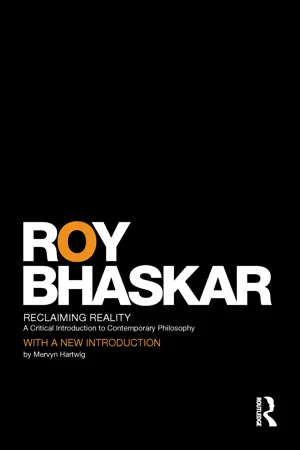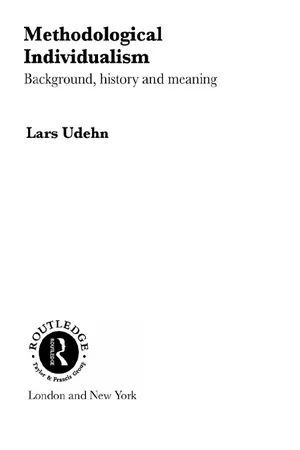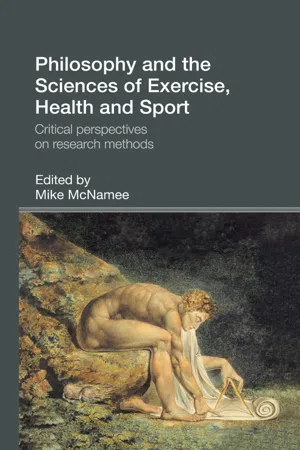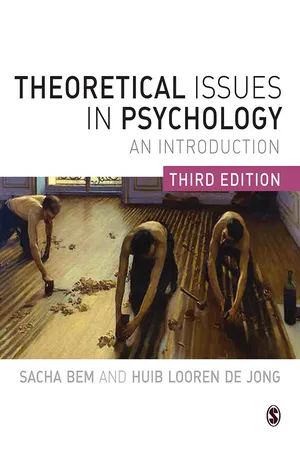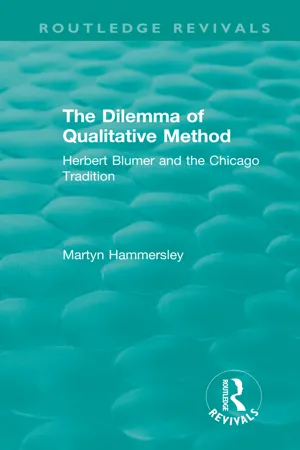Social Sciences
Positivism
Positivism in social sciences refers to the approach that emphasizes the use of scientific methods to study and understand social phenomena. It is based on the belief that knowledge can be gained through empirical observation and measurement, and that social reality can be studied using the same principles as natural sciences. Positivism seeks to establish objective, value-free knowledge about society.
Written by Perlego with AI-assistance
Related key terms
10 Key excerpts on "Positivism"
- eBook - ePub
- Louis Cohen, Lawrence Manion, Keith Morrison(Authors)
- 2017(Publication Date)
- Routledge(Publisher)
With its emphasis on observational evidence and the scientific method, Positivism accords significance to sensory experience (empiricism), observational description (e.g. ruling our inferences about actors’ intentions, thoughts or attitudes), operationalism, ‘methodical control’, measurement, hypothesis testing and replicability through the specification of explicit and transparent procedures for conducting research (Hammersley, 2013, pp. 23–4). Hammersley notes that the terms ‘Positivism’ and ‘empiricism’ are often regarded as synonymous with each other (p. 23), but to equate Positivism simply with quantitative approaches is misguided, as qualitative data are equally well embraced within empiricism. Indeed he notes that ethnographers and discourse analysts rely on careful observational data (pp. 24–5).Though the term Positivism is used by philosophers and social scientists, a residual meaning derives from an acceptance of natural science as the paradigm of human knowledge (Duncan, 1968). This includes the following connected suppositions, identified by Giddens (1975). First, the methodological procedures of natural science may be directly applied to the social sciences. Positivism here implies a particular stance concerning the social scientist as an observer of social reality. Second, the end-product of investigations by social scientists can be formulated in terms parallel to those of natural science. This means that their analyses must be expressed in laws or law-like generalizations of the same kind that have been established in relation to natural phenomena. Positivism claims that science provides us with the clearest possible ideal of knowledge.Where Positivism is less successful, however, is in its application to the study of human behaviour, where the immense complexity of human nature and the elusive and intangible quality of social phenomena contrast strikingly with the order and regularity of the natural world. This point is apparent in the contexts of classrooms and schools where the problems of teaching, learning and human interaction present the positivistic researcher with a mammoth challenge. - eBook - ePub
- John A. Hughes, W. W. Sharrock(Authors)
- 2016(Publication Date)
- Routledge(Publisher)
CHAPTER 3 Positivism and the language of social researchAs mentioned, much of Positivism's motivation came from a strongly held view that the social sciences should endeavour to emulate the most advanced of the natural sciences. Accepting this ambition was one thing, realising it another. It was not clear what it was about the natural sciences which made them apparently so superior as forms of knowledge. It was generally accepted that physics was the most advanced of the natural sciences and so embodied most clearly what must be the scientific method, but quite what it was about physics which marked it out was a matter of debate. However, not much attention was given to the actual practices of the natural sciences by those who would follow their example. Social scientists, in the main, took their ideas about the natural sciences from the philosophy of science, with Positivism as their main inspiration. Following the supposed 'scientific method' as described by Positivism was the main route through which social scientists, through the 1930s to 1960s hoped to move in the direction pioneered by the most successful of the natural sciences and, eventually, equal their achievements.It must be noted, however, that among positivistically inspired social scientists there were debates (as there still are, for although direct allegiance to Positivism has declined since the 1960s, it continues to have influence and adherents) over such questions as the nature of scientific explanation, whether social science theories could attain the categorical certainty of natural science theories or could only reach probabilistic conclusions, whether falsification or verification was the fundamental criterion distinguishing scientific statements from nonscientific ones, and so on. These debates, at one time, formed some of the core issues in the philosophy of social science (see, e.g. Papineau 1978, Ryan 1970). However, some positivists were interested in converting the programme into practice and doing some of the empirical research which their philosophy deemed so all-important. They tried to design proper scientific instruments for social research. It is with these attempts to figure out how to do this that this chapter is concerned. If the example of the natural sciences was to be followed, then how was this to be done? In what way could the positivist's general idea of scientific method be applied to social life? - eBook - ePub
- Ian Shaw(Author)
- 2016(Publication Date)
- Columbia University Press(Publisher)
In the nineteenth century Positivism was in the ascendant, with its approach that knowledge, or at least all that should count as such, could be apprehended through the senses. The method of the natural sciences was seen as applicable to social phenomena. Its significance extended far beyond the field of science (cf. Burrow 1970, Shaw, 2014a). The decline of this faith took place along with a corresponding “reappraisal of traditional and habitual beliefs and modes of action” (Giddens 1993, 136). Logical Positivism emerged as a reaction, as did phenomenology and linguistic philosophy as contrary positions. From 1900 to 1950 newer forms of Positivism provided the dominant methodological justification of “normal science,” “a science practised without constant reference back to fundamental philosophical premises” (Hughes 1980, 35). Positivism claims:• Reality consists in what is available to the senses. • An aversion to metaphysics. Religious, moral, or aesthetic statements were seen as without scientific meaning or at best as statements of preference and taste. • Social and natural sciences share a common logical and methodological foundation, although this does not mean that they use the same methods of inquiry. • The distinction between fact and value is fundamental, but this may not include a dualism of mind and matter.Thus it is marked by a pervasive distinction between empirically grounded knowledge and mere speculation. The distinction between things human and things material is rejected at the level of science. In this way observational language was ontologically and epistemologically privileged. In Positivism the interest lies in method rather than theory. For example, “cause” is treated empirically, and reason is seen as insufficient. The language of “variables” and other mathematical kinds of terms such as “operationalization,” sampling, scaling, correlation, regression, and so on were central to this way of developing positivist visions (cf. Danziger and Dzinas 1997). These are ways of translating concepts into discrete chunks of data. “Objective data is produced by standardised instruments aimed at eliminating sources of bias of all kinds, and providing a neutral observational language” (Hughes 1980, 41–42). - eBook - ePub
Reclaiming Reality
A Critical Introduction to Contemporary Philosophy
- Roy Bhaskar(Author)
- 2010(Publication Date)
- Routledge(Publisher)
4 Philosophies as Ideologies of Science: A Contribution to the Critique of Positivism1 IntroductionIt is my aim in this chapter to describe the way in which a philosophical system, such as Positivism, can function as an ideology for science and other social practices. I want to focus on Positivism both because of its intrinsic historical importance and because it represents a limit with respect to which other philosophies can be defined.Positivism is, in the first instance, a theory of the nature, limits and unity of knowledge. Particular knowledge is of events sensed in perception; general knowledge is of the patterns such events show in space and over time which, if it is to be possible, must be constant (the Humean theory of causal laws). Sense-perception exhausts the possible objects of knowledge. Conversely any object of sense-perception constitutes a possible object of knowledge. Thus the cognitive claims of theory, metaphysics, morality, aesthetics and politics alike are rejected; and (tacitly gendered) man is located within the system of objects on which he acts. Positivism is a limit form of empiricism.Positivism is a theory of knowledge . But any theory of knowledge presupposes an ontology— for it must be assumed, implicitly if not explicitly, that the world is such that it could be the object of knowledge of the specified type. Thus the Humean theory, which forms the lynchpin of the positivist system, presupposes an ontology of closed systems and atomistic events, constituting the objects of actual or possible experiences,1 Moreover any theory of knowledge presupposes a sociology - eBook - ePub
- Lars Udehn(Author)
- 2002(Publication Date)
- Routledge(Publisher)
6 Positivism in philosophy and social science
As we have seen (p. 27), the term ‘Positivism’ was coined by Auguste Comte, who was not a methodological individualist. Nor were the other positivists among the classical sociologists, with the possible exception of Herbert Spencer. This indicates that there is not a necessary connection between these two doctrines. More recent positivist social science, however, is more indebted to British empiricism and the logical Positivism of the Vienna Circle. This influence works in a more individualistic direction.Positivist philosophy
By ‘Positivism’, I understand a philosophy with two basic characteristics: (1) Methodological monism, which is the doctrine that the method of all sciences is one and the same. More specifically, methodological monism means that the social sciences must use the same method as the natural sciences. (2) Empiricism, which means that all knowledge ultimately derives from observation, or experience.From the very beginning, Positivism was advanced as an alternative to metaphysics and this remained an essential feature of this philosophy. In the case of logical Positivism, the demarcation of science from metaphysics was made with the help of the empiricist criterion of verifiability. Methodological individualism sometimes looks like just another variant of the empiricist attack on metaphysics: a bit less radical than phenomenalism and, perhaps, also than physicalism, but, nevertheless, motivated by the same kind of epistemological considerations. It could be argued that flesh and blood human beings are the only directly observable entities in society – if we exclude human artefacts such as buildings, machines, books, etc. – while social wholes and collectives are not in the same way directly given to the senses.1 It would seem, therefore, that empiricism implies or, at least suggests, methodological individualism.2 This relation is asymmetric, however, and does not hold the other way around. Methodological individualism does not imply empiricism and, as a matter of fact, few of the most well-known advocates of methodological individualism have been empiricists. As we have seen in previous chapters, most of them have been hermeneuticians, neo-Kantians, phenomenologists and existentialists. As such, they have adopted a subjectivist version of methodological individualism, which conflicts with the physicalism and behaviourism of most empiricist philosophers.3 - eBook - ePub
Philosophy and the Sciences of Exercise, Health and Sport
Critical Perspectives on Research Methods
- Mike McNamee(Author)
- 2004(Publication Date)
- Routledge(Publisher)
When we run over libraries, persuaded of these principles, what havoc must we make. If we take in our hand any volume; of divine or school metaphysics, for instance, let us ask: Does it contain any abstract reasoning concerning quantity or number? No. Does it contain any experimental reasoning concerning matter of fact and existence? No. Commit it then to the flames: for it can contain nothing but sophistry and illusion. (Cited in Hacking 1983:44.)Among the things that Hacking notes from this quote is the positivistic penchant for slogans. That spirit survives today in those who assert blindly that unless problems have some quantificationist or experimental basis, they cannot claim scientific status. That which is not wrought from the scientific method must therefore surrender all pretence to science (thereby to proper objectivity). Of course a whole host of unscientific biases are in operation here (see Parry, Chapter 2 , on the ideological elements of positivistic thinking). What we can retain here is the positivist’s strong sense of antipathy to metaphysics, on which I shall comment below.Of the term ‘Positivism’ specifically, Halfpenny (1982:15) notes not one but three senses or conceptions of the term in Comte’s writing. First, Positivism refers to a theory of historical development in which the growth of knowledge contributes to the development of progress and social stability. This conception of positivistic philosophy sounds very much a product of its age, while the second and third conceptions have a more modern ring.2 Second, Positivism refers to a claim that only a certain kind of knowledge counts as scientific and that it must be based upon observation of publicly available entities. Finally, Positivism entails the claim that all science proper can be integrated into a unified system.Even if academics were faithful to Comte’s original work, confusion might arise in the applications of a term that slid between the three different senses. Yet modern natural and social scientific research methods talk in exercise, health and sport research is sometimes so loose that the term itself falls into disrepute. Nowhere is this more the case than with the all-pervasive term ‘paradigm’ (discussed below), which is typically cited without any precise meaning in mind. Likewise, calling a researcher or research design ‘positivistic’ often indicates little more than mild and unspecific abuse. When content seems to attach to the ascription, it might mean little more than a predilection for statistics, or a privileging of experimental method, or a dependence on hypothesis testing as a sine qua non - eBook - ePub
Teachers as Researchers
Qualitative Inquiry as a Path to Empowerment
- Joe L. Kincheloe(Author)
- 2002(Publication Date)
- Routledge(Publisher)
Chapter 4 Exploring Assumptions Behind Educational Research; Defining Positivism in a Neo-Positivist EraEquipped with an understanding of the Cartesian tradition, we are prepared to understand its epistemological extension—Positivism. Few epistemological orientations have exerted so much influence or have been so little understood. An historical overview is in order to begin our exploration of Positivism. The Enlightenment (Age of Reason) of the seventeenth and eighteenth centuries realized its rational self-fulfillment with the advent of modern science. True reality, the Enlightenment thinkers posited, was founded upon scientific understanding—the world could be comprehended only via science and scientific methodology. This form of science was universal in the sense that it applied to all subjects of study and was based on mathematics. With the realization of this type of scientific enterprise during the Enlightenment, Western thought was prepared for the advent of what many have called ‘the era of Positivism’ (Held, 1980; Giroux, 1997; Kincheloe, 2001).The History of Positivism
The label, Positivism, was popularized by Auguste Comte, the nineteenth-century French philosopher, who argued that human thought had progressed through three stages: the theological stage, the metaphysical stage, and the scientific or positivistic stage. One could only designate scientific findings as certain in the scientific stage. Comte sought to discredit the legitimacy of thinking which did not take sense experience into account, that is, a priori modes of thought. Advocating such a position, Comte extended the scientific orientation of the Enlightenment (J.Smith, 1983; Kneller, 1984).Comte did not see a distinction between the methods used for research in the physical and the human sciences. Thus, from Comte’s perspective, sociology was a reflection of biology. Society came to be viewed as a body of neutral facts governed by immutable laws. These facts and laws could be researched in the same manner as any physical object could be researched. Like nature, society is governed by natural necessity. It therefore followed that social movements would proceed with law-like predictability (Held, 1980). - eBook - ePub
Theoretical Issues in Psychology
An Introduction
- Sacha Bem, Huib Looren de Jong(Authors)
- 2013(Publication Date)
- SAGE Publications Ltd(Publisher)
Chapter 3.3 ). Social practices, rules and vocabularies make up the necessary context of the meanings of particular behaviours. Therefore, understanding human behaviour requires more than knowledge and a description of spatiotemporal superficialities, more than ‘brute data’, as Taylor (1971) calls them. Brute data are supposed to be certain and their validity cannot be questioned by offering another interpretation. But the problem is this: there are no such objectively given data. Understanding human behaviour requires hermeneutical epistemology which makes us sensitive to the intersubjective and common meanings embedded in the context of a social reality. The empiristic epistemology of the positivists is not adequate enough to make sense of the meanings supplied by humans in various contexts.Are the natural sciences different from the social or human sciences?
But is there, then, a difference between the methodology of the natural sciences and that of the social or human sciences? Is there something special about the subject matter of the latter which tells us not to adopt the method of the former sciences for it? Positivist-empiricist philosophers favoured the belief that the exact natural sciences set the methodological standard, and they adhered to a methodological monism. Already at the end of the nineteenth century the German philosopher Wilhelm Dilthey, one of the founders of the hermeneutical epistemology, proposed to distinguish between natural sciences and humanities, each with its own method: hermeneutics for the humanities. But some modern hermeneutic philosophers do not believe, for their own reasons, that we should distinguish between natural and human (social) scientific methods. Richard Rorty, who is very sympathetic towards hermeneutics, takes sides with the universal hermeneutics of Gadamer. This is an attitude, a general intellectual position, and not just an appropriate method. After the demise of Positivism and empiricism there is no place for an objective, ahistorical foundation of any knowledge. There is no a-historic structure of rationality: ‘We have not got a language which will serve as a permanent neutral matrix formulating all good explanatory hypotheses, and we have not the foggiest notion how to get one’ (Rorty, 1979: 348–9). In the last paragraph we wrote about the ‘hermeneutical epistemology’, but Rorty sees epistemology and hermeneutics as opposites (1979: ch. 7). Epistemology bears the hope of absolute objectivity and agreement based on the alleged existence of a common ground, that is, the notions of empirical data and the mystic correspondence between the objects of reality and the intellect. Hermeneutics holds the negation of all this. For this reason Rorty thinks that there is no requirement that people should be more difficult to understand than things (ibid.: 347) – that there is no essential difference between the human and natural sciences (ibid.: 321). Both jobs are hermeneutical, in the sense of interpretation involving understanding. And so we are not justified in accepting the traditional distinction between explanation in the natural and understanding (‘verstehen ’) in the social sciences (see Chapter 2.3 - eBook - ePub
Jurgen Habermas
Critic in the Public Sphere
- Robert C. Holub(Author)
- 2013(Publication Date)
- Routledge(Publisher)
Adorno’s agreement with Popper extends only to the rejection of the erroneous naturalist paradigm and its extension to social scientific research. When Adorno refers to ‘Positivism’ it seems that, depending on the context, he means both more and less than Popper’s brief description of scientism. He means more in that he extends the category to cover all procedures that isolate objects without reference to the totality of relations in which they are necessarily embedded. In his specific discussions of sociology, however, he means less since he tends to reduce Positivism to empirical survey studies. These studies are not without a place in research. The Frankfurt School often undertook empirical studies in examining the authoritarian personality, and Adorno himself points to the importance of these investigations. Although they only reflect the subjective and reified opinions of the subjects interviewed or surveyed, and therefore represent ideology or false consciousness, Adorno, relying on Hegel, recognizes that even false consciousness is a part of social reality. Empirical research may not deliver the essence of any given question, but ‘appearance is always also an appearance of essence and not mere illusion’ (p. 84). For Adorno ‘Positivism’ in sociological research is not illicit as long as it is accompanied by a realization of what its results represent.Paradoxically, then, Adorno appears to be more tolerant of Positivism than the philosopher whom he accuses of adhering to this doctrine. But this tolerance is strictly limited by a distinction that Adorno draws and Popper does not. From Popper’s talk it is evident that he conceives of critical rationalism as a method applicable to both natural and social science. He draws no distinction between problems that arise in the course of our interaction with nature and those that pertain to society and history. Adorno, by contrast, insists on separating the method for achieving genuine knowledge in social sciences from other approaches to knowledge. The line Adorno draws is not quite the traditional one between the natural and the social sciences found in the works of Vico, Herder, Dilthey and Rickert. As we have just seen, research in the social sciences may even involve survey-style, positivist techniques if used appropriately. Rather, Adorno’s distinction resembles what Horkheimer proposed in positing a critical theory that opposes a traditional theory. - eBook - ePub
Routledge Revivals: The Dilemma of Qualitative Method (1989)
Herbert Blumer and the Chicago Tradition
- Martyn Hammersley(Author)
- 2018(Publication Date)
- Routledge(Publisher)
Knowledge and understanding are at opposite ends of a continuous distribution…. The tests of knowledge are reliability and accuracy, not understanding…. A person, untrained scientifically, may live for a long time among other people and come to have a pretty good understanding of them; yet he would scarcely be called a scientist. His understanding would not be of that accurate, systematic, transferable kind called science.(Ogburn 1932:5)Ogburn argued that not all of the topics dealt with by sociology were currently amenable to a statistical approach, but that in those where this had been applied ‘we certainly know much more about the structure and functioning of society’ (Ogburn 1927:390) ,4In the 1930s and 1940s, some of the advocates of statistical method came to adopt an even more extreme position than Ogburn. They argued that it should be applied across the board to all areas of sociology, and that failure to do so simply represented the attachment of sociologists to outdated philosophies.THE ARGUMENTS OF THE SOCIOLOGICAL POSITIVISTS
An important stimulus to the growing influence of quantitative methods in sociology from the 1930s onwards was the rise to prominence of positivist ideas in physics, philosophy, and psychology.In physics Einstein’s special theory of relativity had a tremendous impact, not only on physicists’ views of the universe, but also on their ideas about their own subject. Einstein’s theory overturned elements of Newtonianism, such as the concepts of absolute space and time, that had been taken for granted by many as proven beyond doubt. A common response was to reject theoretical concepts that refer to unobservables, and to attempt to restrict physics to the description of observables.5 In Chapter 1
Learn about this page
Index pages curate the most relevant extracts from our library of academic textbooks. They’ve been created using an in-house natural language model (NLM), each adding context and meaning to key research topics.



